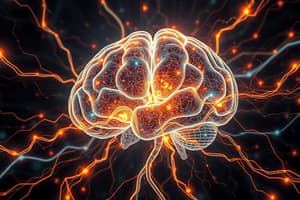Podcast
Questions and Answers
What does fMRI show about activation for voluntary/endogenous attention?
What does fMRI show about activation for voluntary/endogenous attention?
activation along dorsal network
What is the main function of the dorsal posterior parietal cortex and frontal cortex in relation to spatial attention?
What is the main function of the dorsal posterior parietal cortex and frontal cortex in relation to spatial attention?
biasing processing in early sensory regions
What are the main bits of the brain involved in attention according to the text?
What are the main bits of the brain involved in attention according to the text?
Parietal lobes, frontal eye fields, temporal parietal junction, ventral frontal cortex, and the fronto-parietal attention network.
What are the top-down signals for spatial attention and which brain regions are involved in this process?
What are the top-down signals for spatial attention and which brain regions are involved in this process?
What are the main brain regions involved in the attentional modulation of parietal neurons?
What are the main brain regions involved in the attentional modulation of parietal neurons?
What are the main bits of the brain involved in the attentional network according to the text?
What are the main bits of the brain involved in the attentional network according to the text?
What are the main bits of the brain involved in the attentional network according to the text?
What are the main bits of the brain involved in the attentional network according to the text?
Flashcards are hidden until you start studying
Study Notes
Neural Underpinnings of Attention
- Main brain regions involved in attention:
- Parietal lobes: inferior parietal sulcus and superior parietal lobule
- Frontal eye fields
- Temporal parietal junction: inferior parietal lobule and superior temporal gyrus
- Ventral frontal cortex: inferior and middle frontal gyri
Frontoparietal Attention Network
- Functional MRI (fMRI) sensitive to blood oxygen dependent changes
- Increased neural activity results in over-supply of oxygenated blood to active area
- 4-5 second delay in fMRI signal
Top-Down Signals for Spatial Attention
- Dorsal posterior parietal cortex and frontal cortex respond when attention is endogenously directed
- Damage to frontoparietal network causes attention impairments
- Different damage patterns result in distinct symptoms
Unilateral Neglect
- Common outcome of right middle cerebral artery stroke
- Patients behave as if the affected side of space has ceased to exist
- Neglect can occur in multiple modalities and can reflect a bias towards the ipsilesional side
- Clinical presentation:
- Ignore food on one side of their plate
- Fail to shave or make up one side of their face
- Bump into objects on one side
- Fail to read text from one side of the page
Distinguishing Neglect and Visual Field Sensory Loss
- Sensory loss:
- Patients actively compensate for visual field defects
- Aware of the deficit
- Neglect:
- Typically anasognosic (unaware of the deficit)
- Don't compensate
- Attentional rather than sensory
Lesion Site Heterogeneity
- Damage to different parts of the attention network results in variability in patient presentation
- Primarily ventral attentional network affected in spatial neglect
Stimulating Lesions in Healthy Participants
- TMS: focussing on the inferior parietal lobule (angular gyrus vs supramarginal gyrus)
Summary
- Attention relies on a frontal-parietal network of brain regions
- Single neuron recordings show increased firing rates for neurons with attention relative to without attention
- fMRI shows activation along dorsal network for voluntary/endogenous attention
- Attention seems to work by higher-level regions biasing processing in early sensory regions
Studying That Suits You
Use AI to generate personalized quizzes and flashcards to suit your learning preferences.




